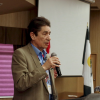A Whitefish Bay Anishinabe First Nation woman has received a Truth and Reconciliation Commission of Canada Scholarship from the University of Winnipeg.
Diana Cowley is one of two recipients of $5,000 Truth and Reconciliation scholarships for 2013, the university announced Dec. 10. The scholarships recognize the work of the Truth and Reconciliation Commission and honour students who are residential school survivors or descendants of residential school survivors.
Cowley, 27, graduated from the University of Winnipeg with a bachelor of arts in indigenous studies but has returned to complete an education certificate so she can become a teacher.
She found herself at a crossroads after graduating with her first degree, for which she majored in Aboriginal governance.
“My interest in becoming a teacher came from a vision quest that I went on about a year ago in finding out where I needed to go in life,” she said. “The dream that I was gifted with was (of) me teaching children about Anishinabe culture.”
Cowley’s maternal grandparents attended residential school in Ontario.
“It was there that our rich and beautiful Anishinabe culture was erased,” she said.
“I believe that re-learning about myself and where I come from, along with understanding more about my culture and spirituality, has helped me in my path to healing.”
In her current academic program, she will focus on the teaching of history and politics.
“My goal is to not only to obtain my education degree but I also hope to get my post-bachelor degree in counselling,” said Cowley, whose family roots are in Whitefish Bay, although she grew up in Winnipeg. “During that time, I want to go back to my community of Whitefish Bay to teach. Whatever the future holds for me, ultimately, will be by the direction of the Great Spirit.”
Cowley is the first person in her immediate family to attend university.
“I believe my generation is working on creating positive change and healing in our community,” she said. “I know I can make a difference through education.”
As for the support she received in the form of the scholarship, “I think I was chosen because I am taking back what was taken away and I will be teaching in truth for renewing good relations with all nations, which is in part of what the commission stands for,” Cowley said.
“I want to say Kitchi-Miigwetch to the Truth and Reconciliation Commission for this award. It’s helping me to stay focused on doing my best through school.”
The University of Winnipeg initiated its Truth and Reconciliation scholarships in 2010, and awards two of them annually.
The other recipient for 2013 is Amber Chartrand of the Dene Nation. She is a second-year University of Winnipeg student majoring in criminal justice and conflict resolution, while juggling her studies with her role as a single parent. Chartrand chose her field of study when she realized how over-represented Aboriginal peoples are in the justice system, in many cases due to the effects of residential schools.
“The Truth and Reconciliation Commission adds its congratulations to the award recipients and encourages them to continue their educational journey,” Justice Murray Sinclair, chairman of the commission, said in a news release. “While residential schools, under the guise of education, have been responsible for harm and damage to Indigenous people and communities in Canada, the commissioners of the TRC believe that education does hold the key to reconciliation.”
Gold has arrived.












Gold has arrived. Here in the north of Ontario we see vast streams of gold shimmering across the landscape as autumn is here and the the leaves are turning...
I am the product, evolution of many thousands of years as are you. I grew up on the land in the remote far north of Ontario following in the footsteps of my...